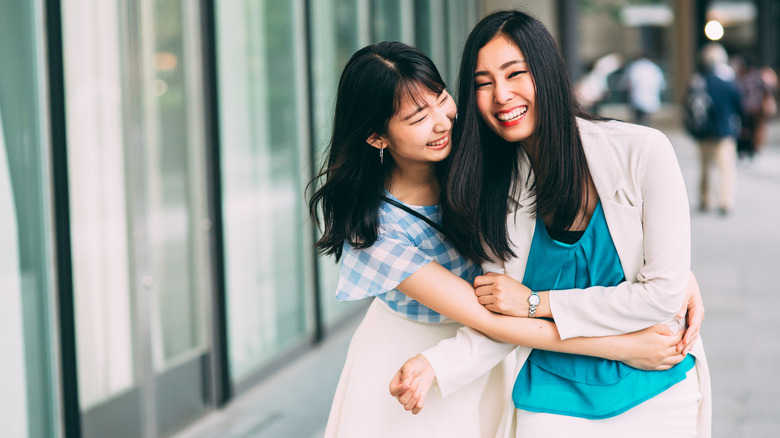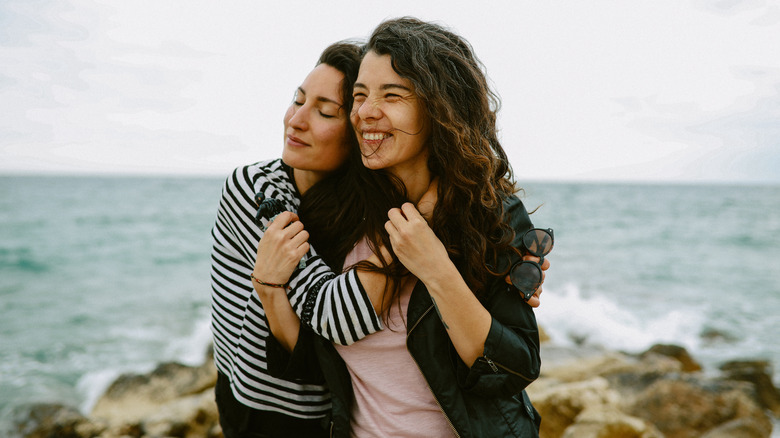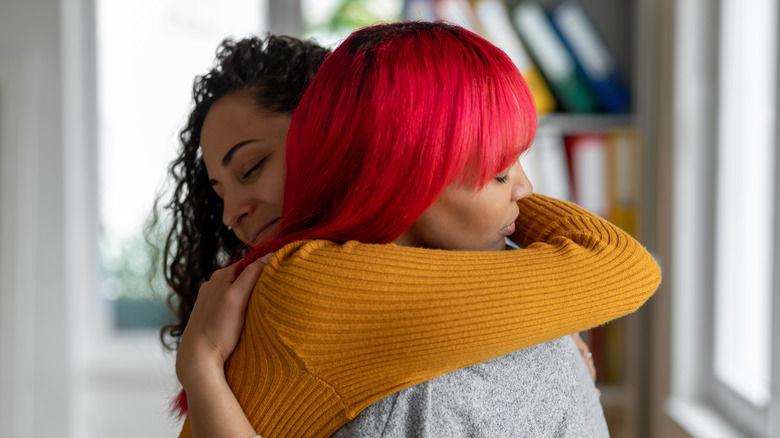If You Hate Being Hugged & Die Inside Every Time, Here's Why
Have you ever left a social event, only to stiffen up when that person you're saying goodbye to goes for a hug? You're not alone. Those of us based in the U.S. live in a culture that is largely pro-hugging, with many defaulting to a good, ol' bear hug as a form of greeting, even upon first meeting someone. However, if the thought of embracing another human makes you want to hide in a cave, don't worry. It's totally normal.
For one, there's the fact that many of us are still dealing with the residual effects of the pandemic lockdown. At the time, many people experienced social situations where close proximity was viewed as stress-inducing, creating a lasting association between physical contact and potential danger.
But what about people who hated hugging long before social distancing? Well, there are several factors that can cause a person to feel naturally averse to hugging, from their relationship attachment style to their upbringing. But it goes beyond just finding hugging off-putting.People with social anxiety can find hugging particularly challenging, and the mood-boosting effects that flood their neighbors when they hug actually prove to be the opposite for them. In these cases, being pushed into a hug, especially an unexpected one, can actually create more stress and exacerbate anxiety. So while science talks about the numerous benefits of hugging –- it can increase oxytocin and reduce stress and inflammation –- it turns out it doesn't offer those same benefits to everyone.
A dislike for hugging could be related to your attachment style
Our reactions to hugs have a lot to do with our attachment style, and how we were raised. Secure and anxious attachment styles are more prone to hugging, while avoidant attachment styles may have a harder time with it. Childhood or adolescent trauma can also make us hug-avoidant. "Our tendency to engage in physical touch—whether hugging, a pat on the back, or linking arms with a friend—is often a product of our early childhood experiences," Suzanne Degges-White, a professor of Counseling and Counselor Education at Northern Illinois University explained, per a later publication by Time. Some experts hypothesize individuals who lacked this type affectionate touch from their caregivers in their early years may have issues with their vagus nerve; a portion of the parasympathetic nervous system that research has found plays a role in our ability to release oxytocin, aka the feel-good hormone that some people get from hug.
Being neurodivergent also has a significant impact on one's desire for hugging and physical touch, particularly for those on the autism scale. Indeed, some separate research has linked decreased vagus nerve function to those on the autism spectrum. Martha Kaiser of the Child Neuroscience Laboratory at the Yale Child Study Center explains, via Time: "The brains of people high in autistic traits aren't coding touch as socially relevant." Kaiser claimed that these findings are actually very useful; families and loved ones of those with autism are able to understand more clearly why the individual doesn't respond positively to hugs. They could work on it by finding ways to make touch a pleasant experience for the neurodivergent person, prioritizing the individual's need to feel autonomous and in control of the moment.
Low self-esteem can also play a role
Beyond attachment styles, our sense of self plays a role in how we feel about hugs. According to Psychology Today, those with a higher sense of self-esteem are more likely to have positive reactions to touching and embracing others. Those with low self-esteem may find hugging significantly less pleasurable. Body image, the outlet further points out, can also influence how much we want to be hugged. For those who have more insecurities around their bodies, hugging can be a distasteful experience.
If you're unhappy with this trait in yourself, there are certain measures you can take to explore the benefits of hugging. Degges-White recommends trying out different levels of closeness in hugs with trusted loved ones to gradually grow more comfortable. Discuss the matter with a therapist, too. However, many researchers point out that we're in an overly-huggy society, and it's unfair to pressure those who don't enjoy it.
In fact, for those who love hugging, this might be an opportunity for reflection and change. Read social cues in others; if a person pulls away or puts out their hand, give them a handshake instead of a hug. For many people, including those who are neurodivergent and unlikely to initiate contact, this is plenty good as a polite greeting. Or better yet, ask the person if they are comfortable hugging. Don't be too sure that everyone loves hugging as much as you do.


